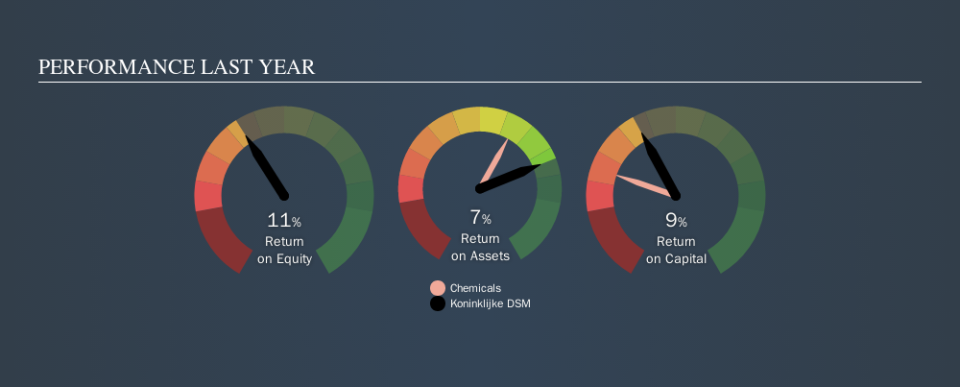Does Koninklijke DSM N.V.’s (AMS:DSM) ROCE Reflect Well On The Business?

Today we'll look at Koninklijke DSM N.V. (AMS:DSM) and reflect on its potential as an investment. Specifically, we'll consider its Return On Capital Employed (ROCE), since that will give us an insight into how efficiently the business can generate profits from the capital it requires.
First up, we'll look at what ROCE is and how we calculate it. Next, we'll compare it to others in its industry. Last but not least, we'll look at what impact its current liabilities have on its ROCE.
Understanding Return On Capital Employed (ROCE)
ROCE measures the 'return' (pre-tax profit) a company generates from capital employed in its business. All else being equal, a better business will have a higher ROCE. Ultimately, it is a useful but imperfect metric. Author Edwin Whiting says to be careful when comparing the ROCE of different businesses, since 'No two businesses are exactly alike.
So, How Do We Calculate ROCE?
The formula for calculating the return on capital employed is:
Return on Capital Employed = Earnings Before Interest and Tax (EBIT) ÷ (Total Assets - Current Liabilities)
Or for Koninklijke DSM:
0.086 = €961m ÷ (€14b - €2.7b) (Based on the trailing twelve months to June 2019.)
So, Koninklijke DSM has an ROCE of 8.6%.
Check out our latest analysis for Koninklijke DSM
Is Koninklijke DSM's ROCE Good?
When making comparisons between similar businesses, investors may find ROCE useful. We can see Koninklijke DSM's ROCE is around the 8.6% average reported by the Chemicals industry. Regardless of where Koninklijke DSM sits next to its industry, its ROCE in absolute terms appears satisfactory, and this company could be worth a closer look.
In our analysis, Koninklijke DSM's ROCE appears to be 8.6%, compared to 3 years ago, when its ROCE was 3.5%. This makes us think about whether the company has been reinvesting shrewdly. You can see in the image below how Koninklijke DSM's ROCE compares to its industry. Click to see more on past growth.
When considering ROCE, bear in mind that it reflects the past and does not necessarily predict the future. ROCE can be deceptive for cyclical businesses, as returns can look incredible in boom times, and terribly low in downturns. This is because ROCE only looks at one year, instead of considering returns across a whole cycle. Since the future is so important for investors, you should check out our free report on analyst forecasts for Koninklijke DSM.
How Koninklijke DSM's Current Liabilities Impact Its ROCE
Current liabilities include invoices, such as supplier payments, short-term debt, or a tax bill, that need to be paid within 12 months. Due to the way ROCE is calculated, a high level of current liabilities makes a company look as though it has less capital employed, and thus can (sometimes unfairly) boost the ROCE. To counteract this, we check if a company has high current liabilities, relative to its total assets.
Koninklijke DSM has total assets of €14b and current liabilities of €2.7b. Therefore its current liabilities are equivalent to approximately 19% of its total assets. Low current liabilities are not boosting the ROCE too much.
The Bottom Line On Koninklijke DSM's ROCE
With that in mind, Koninklijke DSM's ROCE appears pretty good. There might be better investments than Koninklijke DSM out there, but you will have to work hard to find them . These promising businesses with rapidly growing earnings might be right up your alley.
For those who like to find winning investments this free list of growing companies with recent insider purchasing, could be just the ticket.
We aim to bring you long-term focused research analysis driven by fundamental data. Note that our analysis may not factor in the latest price-sensitive company announcements or qualitative material.
If you spot an error that warrants correction, please contact the editor at editorial-team@simplywallst.com. This article by Simply Wall St is general in nature. It does not constitute a recommendation to buy or sell any stock, and does not take account of your objectives, or your financial situation. Simply Wall St has no position in the stocks mentioned. Thank you for reading.

